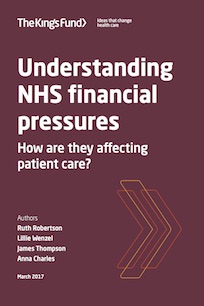News / Financial pressures affecting care
In a report published today - Understanding NHS financial pressures - the fund said that the slow down had taken some time to affect frontline services. But, while acute and specialist care had been relatively protected – high profile services that attracted the public’s attention – cuts in the lower-profile community and public health services threatened to undermine the NHS Five-year forward view .
.
Researchers looked at the impact of financial pressures on four services – testing for and treatment of sexually transmitted infections (STIs); district nursing; elective hip replacement; and neonatal care.
It found evidence of cuts in STI care and district nursing – around a quarter of local authorities reduced spending on the former by more than 20% between 2013/14 and 2015/16 and further cuts were planned. This had led to fewer clinics and staff reductions in some areas.
Though spending information was limited, the researchers found that the budgets of many district nursing services had been static or reducing despite a significant rise in activity. They found evidence of access criteria being tightened and greater delays for non-urgent referrals. The report added that community services are particularly vulnerable because, with block contracts, funding is not directly linked to activity. Care is less visible and quality more difficult to monitor.
The King’s Fund said there is emerging evidence that hip replacements are beginning to be affected. Though the number of hip replacements had risen in the last few years, commissioners were attempting to manage demand and activity in 2015/16 was slightly lower than the previous year.
There was no clear evidence linking finances to reductions in neonatal care, though the fund said longstanding pressures, including workforce shortages, mean many units do not meet recommended staffing levels.
Ruth Robertson, a fellow in health policy at the King’s Fund and lead author of the report, said that longer waiting times for hospital treatment and restrictions to operations made up just one small part of the picture.
‘Our research shows that services like district nursing and sexual health, where we found evidence that access and quality are deteriorating for some patients, have been hardest hit by the financial pressures facing the NHS but that this is often going unseen.
‘This undermines the vision set out in the Five-year forward view to strengthen community services and focus on prevention. If the NHS wants to transform care and keep patients healthy and out of hospital it will need to invest more in community and public health services.’
NHS Providers policy and strategy director Saffron Cordery said it was worrying that the effects were most pronounced in community services and public health. ‘The vision outlined in the NHS Five-year forward view was predicated on improvements in prevention, and providing more care closer to home rather than in hospital, to help balance the equation of rising demand and costs with no additional resources. This report suggests the NHS is moving in the wrong direction and that although times are hard now, there’s worse to come,’ she added.
Related content
We are excited to bring you a fun packed Eastern Branch Conference in 2025 over three days.
This event is for those that will benefit from an overview of costing in the NHS or those new to costing and will cover why we cost and the processes.